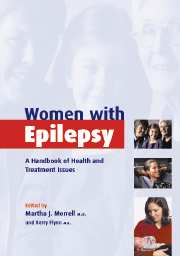Book contents
- Frontmatter
- Contents
- List of contributors
- Part I The woman with epilepsy
- Part II Epilepsy diagnosis and treatment
- Part III Hormones and the brain
- Part IV Health challenges for women with epilepsy
- Part V Family planning, pregnancy, and parenting
- Part VI Living well with epilepsy
- Appendix: The Epilepsy Foundation's Campaign for Women's Health: bringing help and hope to women with epilepsy
- Index
Appendix: The Epilepsy Foundation's Campaign for Women's Health: bringing help and hope to women with epilepsy
Published online by Cambridge University Press: 02 November 2009
- Frontmatter
- Contents
- List of contributors
- Part I The woman with epilepsy
- Part II Epilepsy diagnosis and treatment
- Part III Hormones and the brain
- Part IV Health challenges for women with epilepsy
- Part V Family planning, pregnancy, and parenting
- Part VI Living well with epilepsy
- Appendix: The Epilepsy Foundation's Campaign for Women's Health: bringing help and hope to women with epilepsy
- Index
Summary
A commitment to women
More than 1 million American women and girls are living with seizure disorders. Seizures and exposure to antiepileptic drugs (AEDs) alter female reproductive hormones and may have a negative effect on pregnancy and reproductive health. For instance, women with epilepsy are at greater risk for pregnancy complications, and fetal exposure to AEDs increases the risk of birth defects. The efficacy of hormonal contraceptives may be compromised by interactions with AEDs. Complicating these concerns, many women with epilepsy are seen by health-care professionals who are unfamiliar with these issues. A lack of research in this area compounds the problem.
For many years, the Epilepsy Foundation has received requests for information about the special issues facing women with epilepsy. In order to address these needs, the Foundation established a Committee on Women's Health. The committee included women with epilepsy, experts in the field of epilepsy and women's health, and representatives from the Food and Drug Administration and the National Institutes of Health. The committee was convened to explore these reports and identify the critical health issues facing women with epilepsy. It concluded that further research and better access to accurate information are needed to guide diagnosis, enhance medical care, and improve the quality of life for women who have seizures.
The committee made extensive recommendations in the areas of advocacy, public and professional education, patient care, and research and established objectives for a project focusing on the needs of women with epilepsy.
- Type
- Chapter
- Information
- Women with EpilepsyA Handbook of Health and Treatment Issues, pp. 287 - 290Publisher: Cambridge University PressPrint publication year: 2003

